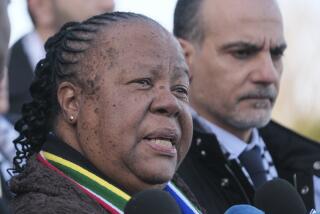Albertina Sisulu dies at 92; veteran of South African anti-apartheid movement



Notable music deaths of 2011 (Paul Hawthorne / Getty Images)


Notable deaths of 2010 (Wally Skalij / Los Angeles Times)

Notable sports deaths of 2011 (Harold Matosian / Associated Press)

Notable sports deaths of 2011 (AFP / Getty Image)

Notable sports deaths of 2011 (Diamond Images / Getty Images)

Notable film and television deaths of 2011 (Kevork Djansezian / Associated Press)

Notable deaths of 2010 (John Redman / Associated Press)

Notable deaths of 2010 (Louis Sahagun / Los Angeles Times)

Notable sports deaths of 2011 (Jonathan Ferrey / Getty Images)

Notable deaths of 2010 (Lawrence Lucier / Steinway & Sons via Getty Images)

Notable deaths of 2010 (Jim Dyson / Getty Images)

Notable deaths of 2010 (Mike Groll / Associated Press)

Notable deaths of 2010 (Michael Ochs Archives / Getty Images)

Notable deaths of 2010 (Bill Sikes / Associated Press)


Notable deaths of 2010 (Joe Brier / McClatchy-Tribune)

Notable deaths of 2010 (Liz O. Baylen / Los Angeles Times)

Notable deaths of 2010 (Wayne Risher / Associated Press)

Notable deaths of 2010 (Rick Bowmer / Associated Press)

Notable deaths of 2010 (John Gwillim / Associated Press)

Notable film and television deaths of 2010 (Bob Chamberlin / Los Angeles Times)

Notable deaths of 2010 (Rick Bowmer / Associated Press)

Notable deaths of 2010 (Stephan Agostini / AFP/Getty Images)

Notable deaths of 2010 (Robert Gauthier / Los Angeles Times)

Notable film and television deaths of 2011 (Nick Ut / Associated Press)

Notable deaths of 2010 (Anna Moore Butzner / Grand Rapids Press)

Notable deaths of 2010 (Christophe Ena / Associated Press)

Notable deaths of 2010 (Hillery Smith Garrison / Associated Press)

Notable deaths of 2010 (Mark Boster / Los Angeles Times)

Notable deaths of 2010 (Michael Ochs Archives / Getty Images)

Notable deaths of 2010 (Mustafa Quraishi / Associated Press)

Notable deaths of 2010 (Lawrence K. Ho / Los Angeles Times)

Notable deaths of 2010 (Karen Tapia-Andersen / Los Angeles Times)

Notable deaths of 2010 (Roald Berit / AFP/Getty Images)

Notable deaths of 2010 (Eddie Adams / Associated Press)

Notable deaths of 2010 (Charles Dharapak / Associated Press)

Notable deaths of 2010 (Alex Wong/Getty Images)

Notable deaths of 2010 (Karen Bleier, AFP/Getty Images)

Notable film and television deaths of 2010 (Dave Hogan / Getty Images)




Notable film and television deaths of 2010 (Bob Chamberlin / Los Angeles Times)
Albertina Sisulu, a veteran of the anti-apartheid movement who saw her children become leaders in a democratic South Africa, died Thursday in Johannesburg. She was 92.
Her death was confirmed by African National Congress spokesman Brian Sokutu, but no other details were provided.
Sisulu’s husband, Walter, who died in 2003, spent more than 25 years in custody on Robben Island alongside Nelson Mandela, whom he had brought into the ANC, now South Africa’s governing party. Mandela was Walter Sisulu’s best man at the couple’s wedding in 1944.
While her husband was on Robben Island, Albertina Sisulu raised their five children. She spent months in jail and for several years was banned from traveling or speaking publicly.
Trained as a nurse, Sisulu campaigned against apartheid and for the rights of women and children. She was a leader of the United Democratic Front, a key anti-apartheid coalition in the 1980s that brought together religious, labor and community development groups. She also was a leader in the ANC and the ANC’s women’s wing.
“Over the years I got used to prison, banning and detention. I did not mind going to jail myself, and I had to learn to cope without Walter,” she once said. “But when my children went to jail, I felt that the [oppressors] were breaking me at the knees.”
Daughter Lindiwe Sisulu is now South Africa’s defense minister. Son Max Sisulu is speaker of the National Assembly. Daughter Beryl Sisulu is South Africa’s ambassador to Norway.
Albertina Sisulu also served in parliament, taking a seat after the first all-race elections in 1994 and serving four years.
Cape Town’s revered retired Anglican Archbishop Desmond Tutu once said of Walter and Albertina Sisulu: “They gave themselves for the cause of liberation, utterly, selflessly, with no thought of reward.”
She was born Oct. 21, 1918, according to a biography on the ANC website. Sisulu took part in some of the iconic moments of the anti-apartheid movement, including the launch in 1955 of the Freedom Charter, which proclaims that “South Africa belongs to all who live in it, black and white.”
She was a leader in a 1956 march by thousands of women of all races opposing the extension to women of pass laws, which restricted the movement of black South Africans. A slogan from the protest was, “You strike a woman, you strike a rock.”
More to Read
Start your day right
Sign up for Essential California for the L.A. Times biggest news, features and recommendations in your inbox six days a week.
You may occasionally receive promotional content from the Los Angeles Times.
The Associated Press is an independent, not-for-profit news cooperative headquartered in New York City.
More From the Los Angeles Times
-
April 21, 2024
-
-
-






